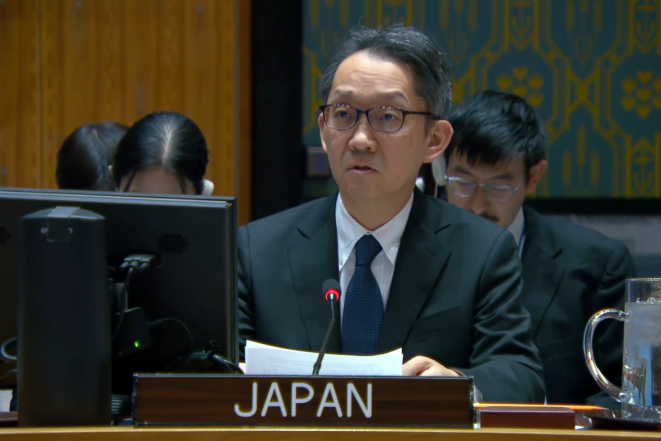Statement by H.E. Ambassador MIKANAGI Tomohiro, Deputy Permanent Representative of Japan to the United Nations, Briefing by the International Criminal Court (ICC) Prosecutor to the UN Security Council on Libya
2024/11/19

(As delivered)
Thank you, Mr. President.
I thank Prosecutor Khan for his briefing from Tripoli on the 28th report on the situation in Libya.
I welcome Ambassador El-Sonni, Permanent Representative of Libya, to today’s meeting.
Japan has been proactively working on the situation in Libya as the chair of the sanctions committee as well as the ICC co-focal point at the Security Council together with Switzerland over the past two years.
We have been closely monitoring the situation in Libya as it has significant ramifications on peace and security in the region. In this context, we note with concern the recognition in the report that the crimes linked to the situation in 2011 have been continuing. These crimes must stop.
The activities of the Court in Libya should have a tangible impact on holding perpetrators accountable and preventing further violence. In this regard, we welcome the ongoing investigation by the ICC in Tarhuna, including the recently unsealed arrest warrants for six suspects. As for the arrest of alleged smugglers involved in crimes affecting migrants, we have seen encouraging progress in effective cooperation with national authorities of third countries.
Mr. President,
Japan welcomes the Court’s Roadmap towards the completion of the investigative phase by the end of 2025. The implementation of outstanding arrest warrants for trial is critically important to achieve that goal and send a clear message against impunity. Cooperation by the Libyan authorities to provide information continues to be a key to ensuring arrest. We are pleased to hear of recent positive cooperation by the Libyan authorities, referencing this report, which is an obligation under Security Council resolution 1970 (2011).
We also welcome the Court’s approach that a judicial and complementarity track will proceed in parallel.
On the judicial track, ensuring accountability for the people of Libya in the transition process is obviously crucial.
For the complementarity track, there remain some challenges which require further assistance: such as some criminals remaining outside the prosecutorial reach of the competent Libyan authorities, and detaining suspects of serious crimes for prosecution.
Japan appreciates the Court for its continued engagement with the affected communities, including through civil society.
In this regard, we support the ICC’s effort to establish a field presence in Tripoli, giving careful consideration to any impact on budget, and hope that this enhanced presence will help improve the capacity of the Libyan authorities, as well as deepen people’s understanding of the ICC’s complementarity activities. Such an initiative will help bring justice and deter further serious crimes.
Mr. President,
Before concluding, Japan reiterates the importance of justice under the rule of law. The activities of the Court in Libya to fight against impunity should serve not only the victims of past crimes, but also future generations by helping to ensure justice for all and deter further serious crimes. We strongly hope that these will also promote respect for human rights and human dignity in the long run. Japan always stands ready to support the ICC to fulfill its critical role.
Thank you.
